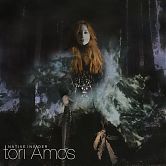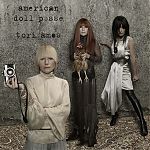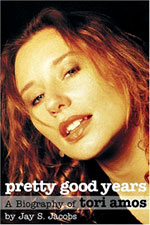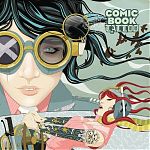- Articles
- Cherries
- Minutiae
- Q&A
- RAINN
- Releases
- Reviews
- Site News
- Them
- Toriphiles
- Touring
- TV/Radio/Web
- Video
News Archives
Keep an eye on our Twitter and Facebook pages since we often post quickie updates there when we're on-the-go.
During tours, we do our best to cover setlists in real-time on Twitter. If you want to tweet a show in, just DM or @ us on the day and tell us to watch your stream that night.
Tori is touring in 2017 to support the release of Native Invader. The European legs runs from early September through early October and the North American leg runs from late October to early December. We do not know if additional dates elsewhere will be added.

Native Invader (album, 2017)

Unrepentant Geraldines (album, 2014)

Gold Dust (album, 2012)

Night of Hunters (album, 2011)

Midwinter Graces (album, 2009)
 Abnormally Attracted To Sin (album, 2009)
Abnormally Attracted To Sin (album, 2009)
Live at Montreux 1991/1992 (DVD, 2008)

American Doll Posse (album, 2007)

A Piano (boxed set, 2006)

Pretty Good Years
(bio, 2006)

Fade To Red
(DVD, 2006)
 Comic Book Tattoo (book, 2008)
Comic Book Tattoo (book, 2008)News: Glamour Interview (October 4, 2012)
You have to think about the art form. It’s not just opening the closet up and letting it all spill out. It’s opening the closet to start taking things out, and deciding how you want to show people, and to get them experiencing it. Because really, it’s not just about how you showing it yourself, it’s about engaging someone else to open up their closet of emotions.
In a rather lengthy interview for the UK magazine Glamour, Tori spoke to Jenny Selby about everything from Gold Dust to her relationship with England, her thoughts on the past, present and future women in the music industry to, the craft of song-writing, and, yes, Fifty Shades of Grey. o
Thanks to RAOF for the tip on this unexpectedly great conversation!
INTERVIEW: Tori Amos
By Jenn Selby Thursday, 4 October 2012
She needs no introduction. The legendary singer/songwriter on feminism, fashion, Fifty Shades and how she’s celebrating 20 years in the music industry…
GLAMOUR: You’re currently celebrating 20 years in the music business. What made you decide that Gold Dust, a reimagining of tracks from your back catalogue backed by the Metropole Orchestra, was the way you wanted to mark the occasion?
Tori Amos: “When we were in rehearsals with the Metropole Orchestra, I was beginning to see different pictures in the songs than I had in the past. On all the records before, I’d never recorded with a string or brass section. You unzip the skin and sing to an engineer. You sing alone. So, even with the band, tracking, the emotion of the performance would happen in a very… The singing has been intimate forever. So the idea of singing these songs with 56 people in the other room all listening in, and the control room packed with people… There was so many people around. And I think it pushed me in a different place, in a context that I had never been in before.
“So the picture started to change, the songs started to have a different meaning. I know them very well, I know them as if they were a twin, but suddenly, they were familiar but strange at the same time. They [the orchestra] were there live, putting their emotion into it, and I’m responding to their emotion, almost before I put my music on top. So I never responded. Until that moment. So that was the seed. So we expanded on the repertoire. We decided to add more songs to tell different moments over the last 20 years.”
G: Was there an autobiographical element to the song choices you’ve made? Why so? Why the absence of ‘the hits’, like Professional Widow?
T: “Well, Cornflake Girl I could hear with a big band maybe, but she didn’t want it. She didn’t need this kind of thing. But Precious Things did. And there were some that did want it, but at the time I had to make some choices. Hey Jupiter, The Dakota [Version] was there wanting to come, and she did come with the quartet, and an arrangement is happening for her live with the Metropole, so she will be played live. But at the time, I had to make choices. Gold Dust was chosen over Ribbons Undone, because they’re both very much Tash [Tori’s daughter, Natasha] songs. And so, instead of choosing two I chose one. Marianne was chosen because of teenage suicide or drug overdose and what that question is. I felt that California had to be included… She didn’t make the record, she’s on a bonus… Because of the idea that mothers don’t have that question of uselessness, that ‘They’d be better off without me.’ It’s not just young women that ask that question. And I felt it was important to have that in the frame. So, making the choices of what needed to come so that the songs didn’t need to repeat themselves to make a complete memory box.”
G: How do you continually source inspiration for new music? Does it come naturally to you, or do you create a space or a mood for yourself? People talk about the difficult second album, but what happens on album number 10, 11 and 12?
T: “Well, touring is a big opportunity. That’s why I stand at the stage door every day and people come to see me. I’m very fortunate. People come up to me in the coffee shop, anywhere, and tell me stuff. ‘When I heard this song, this is the story that happened.’ And what they might not know is occurring is that when they’re telling me that, I’m not hearing that song in my head. So say they’re just talking about Jackie’s Strength before they got married, and they listen to it, they’re telling me their story. I’m not hearing Jackie’s Strength. I’m listening and a new rhythm is happening. So, the conversations that I’ve been having, even before Little Earthquakes, with people, it’s always been that way. It starts to open up a valve, so a perception – I couldn’t hear it before – starts to open.
“And you keep travelling. You collect these, and then I go to my beach house in Florida. I have to separate myself as a wife and mother. The musician, composer, has to be able to sharpen the pencil, not walk on eggshells. So I have to break my routine. I have to be able to not be held hostage. If you’re a good mum, you’re trying to create a safe place, and as a writer, you don’t want to say things that are necessarily safe. And sometimes you have to say things that are tough. And look at yourself in a tough way, and that isn’t always good for a kid. So I take myself into other situations and places, I travel a lot when the writing being in me says, ‘You need to grow.’”
G: Your daughter Tash is quite musical as well, isn’t she?
T: “Yeah, she is.”
G: What sort of musical education did you give her? Did you give her one, or did you just let her discover her own musical path?
T: “She’s grown up around it. She has an ear, for sure. She also loves acting and story, she likes story. She’s at Silvia Young Theatre School. So she’s in development, she’s finding her art and her inspiration, and I think the musician in me watches and encourages. And the mother in me loves. I think the mother wants to hold the space for her. To love a child, you know, love them through their different phases. The musician in me has to be careful not to get in between her process. Because, you know I’ve heard people that are kids of great artists and great musicians and I’ve heard them say to me that, you know, it was intimidating, because my parents would criticise my art and push me because they thought I was capable. So how do you encourage and not thwart or clip the wings of? Because she has a different muse. It’s not going to be the same, and shouldn’t be. A very different path.”
G: Some of our readers are quite young indeed. If you had the chance to give them an awesome educational history of female musicians, who would you suggest they go back and listen to?
T: “There are a lot of great female musicians, my gosh! I’d say the early Joni Mitchell back catalogue. Without even mentioning names, I would look out for women who were writing and co-writing their material over the last 30 years. You’ll find out who they are. The quick way to educate yourself are the pivets – the women that did something first, and that were unique. So you gotta do Joni Mitchell. You’ve gotta do Kate Bush. You’ve got to do Tracy Chapman. And Suzanne Vega, important for the poetry. You’ve got to do Bjork in the early days. Just make sure you get a sense of their work. You need to do Patti Smith, because of what she’s done and what she’s still doing. And PJ Harvey. I think that’s enough for now. There are so many. I think if we stop when I came out in 1991, 1992, we’ll stop there, because there are so many that came after that I’d be here endlessly. But that’s to give young girls an education of the feminists.”
G: What do you think is the biggest challenge that emerging female singer/songwriters in the music industry face today?
T: “They’re looking for the next big thing all the time. But once you’ve achieved success, quite possibly… Unless you’re Adele, but you know what I mean… But for many of them, then people are looking for the next new voice. What did exist in my day is that people wanted to grow with their artist, and to have them in their life and to want to know what they’re saying ten years from now, 20 years from now after different experiences. But now, there seems to be a culture, and there’s a culture within the industry as well, get them in, get them out. Not development. And that is worrying. Because if you’re thinking of a career in music as a singer/songwriter, there is a climate that says that they want the next new thing. So that is there. How do you combat that? You keep growing as an artist, you keep transforming. You must keep exploring. Or you get left behind. People will get bored.”
G: Do you think there are any female pop artists that are dangerous to the progression of women in the industry?
T: “Well, what I would say without mentioning names is that there’s a thought that women speaking their own voice in their own songs won’t sell as much as if you bring in the writers who follow the commercial trend. And if you’re talking about anything political and potent and gutsy and sharp. I mean, there was a lot more support for women talking about heavy stuff 20 years ago, because there was a huge indie movement. But now… I don’t think I’d get a record deal now. I mean, if I were that age now. I don’t think people would want to be hearing or supporting projects of mine that were talking about certain issues in that way, because [the industry is] much more safe, in a way. Because they want the women themselves to be the content. I’m not talking about what they’re wearing, I’m talking about the content. They don’t want it to be political. And when I say political, I’m talking about rape issues, I’m talking about the shocking statements that came out this summer in the United States.
“Sometimes you have to get your foot in the door, and maybe you’re pushed to co-write to get your foot in the door. You can have that experience. I did that in the mid 80s and then was able to self-pen. But yes, I do think that the idea that a woman speaking with her own voice won’t be as effective, as in give as many sales, as if we go to the writers who will produce the commercial, the same thing. So that’s dangerous.”
G: What does the term ‘fashion’ mean to you? Your image has always been important throughout your career…
T: “Yeah, it’s more important now to me than it was in the 90s. In the 90s, Karen Binns was doing everything, my stylist, and I would go along with it, but now I take an active interest in it and I have a daughter who thinks it’s very important to her. She thinks it’s your artwork, it’s a statement about what you’re saying. It’s a method of you expressing yourself. So I look to her and to Karen, because I think they both have great taste. And Karen is her Aunt Karen. They have a real closeness, so Tash has been inspired by her, too. And it’s great to have a daughter who comes into my closet who starts wearing things and trying things, because I have everything from the tours, and we wear the same shoe size now – and she’s 12. Some of the heel height is too high as far as it’s appropriate, but around the house, she walks around and stuff. She knew how to walk in heels at about eight-years-old.”
G: Campaigning has been a big part of your life as well. You set up RAINN in the USA, which provides a help line for victims of sexual assault. Would you ever consider setting up something similar here in the UK?
T: “Because I’m a US citizen, I don’t vote here. My status is that I’m a guest. Because in America, I was able to achieve that. So as a guest I’m in a different position legally and everything else. Mark [Hawley, Tori’s husband and producer] and I have a bi-continental relationship. My home is Florida, and his home is here. So I pop in and out, and Tash goes to school here, but I pop in and out.”
G: Are you quite aware of UK politics?
T: “Well, I like to think I know what’s going on, because the world is global now. I think people in the UK, I’m happy to see, are choosing to see what’s going on globally, not just here. And because of the internet, you’re able to do that, and I would encourage young women to really know what’s going on. On the continent, of course in Europe, in Russia – with Pussy Riot. How brave are those women? And how afraid… One of the most powerful men in the world [Russian President Vladimir Putin] is afraid of three female musicians. More afraid of them than he is of the United States of America. If I were him, I would have played a very different game, just because he’s shown to the world how terrified of three women [he is]. By throwing the book at them in this way? He’s given them power. The moment is growing, and he can’t stop it now. He’s martyred them.”
G: What do you think we could do in the UK to improve the treatment and rehabilitation of victims of sexual assault?
T: “I don’t know if women know where they can call or know where they can go, to talk… [Or to visit] Forums for support. I’m quite concerned about the sexual slave trade that’s happening right under our noses. It’s happening in the States too, it’s happening everywhere. And you think it isn’t happening in England or in America. Oh, but it is. It’s happening. And sometimes it’s happening in ways that when I hear people talk to me about their experiences, I’m appalled to think that with all this technology that we have, and how technology grows over time, that this issue has not gotten better.
“It’s not as if we’ve reached consciousness and have thought, OK, a women in servitude. I’m not talking about a choice she’s making to be in that industry. I’m talking about being in servitude because she’s trapped. Because it feels like she can’t get out. Where can she go for support? Sometimes she gets cut off from everybody. So I don’t know if GLAMOUR can put a number in here, I don’t know what you have in your infrastructure that is the equivalent of RAINN. I’d love for that to be included [Scroll down to the bottom of the page to see our list of useful links and numbers].”
G: You speak and sing very openly about your own experiences. Would you encourage others to do the same as a means of catharsis?
T: “Absolutely. I think part of the healing is acknowledging, and poetry is sometimes the way, or music the way, or art or drawing, of expressing it in that way. What it does is it takes something that was destructive and you create with it. And that’s where the power is. That’s when you’re saying, ‘I won’t be part of victims anonymous anymore, wearing my badge. I’m going to accept that this happened and now, instead of being caught in the web of destructiveness of it I can see the damage, I can see the damage has been done. What would my life have been like? What would I have been like? How would my relationships have differed? Well, I can’t know that. But what I can do is create with it.’ Then you’re on the front foot. Not on the back foot. And when you’re on the front foot, there is the power. And that is where the healing begins.”
G: What is it like to expose these things to the world through your music? How to you decide what to filter, and what to let out?
T: “Well, I don’t see it at all as confessional, because I don’t see it as I’m going to a priest, if I’m a Catholic, or to a therapist. I go to a therapist. There is an artform involved. It’s not just unzipping the skin and letting all the organs all out. There is a focus to it. I don’t do it casually and I do have a filter. And the filter is so that it’s not just… If you’re going to do that, you have to be very clear when it’s just… Just throwing everything out, the baby and the bathtub. You know, throwing out the whole kitchen. It’s not as if you’re just dumping emotions out. You have to have an editing process.
“That doesn’t mean that you don’t tell the dark things, you have to craft it. You have to think about the art form. It’s not just opening the closet up and letting it all spill out. It’s opening the closet to start taking things out, and deciding how you want to show people, and to get them experiencing it. Because really, it’s not just about how you showing it yourself, it’s about engaging someone else to open up their closet of emotions. That’s the thing that I always thought. The male poets that do that, they don’t get called confessional. They get called poets. So when women are doing it, [it is perceived] as if it’s cathartic. Well, whether it is or not, this isn’t an exercise of just downloading what’s happening to make you feel better. It’s a very focused art form.”
G: How do you feel about the whole Fifty Shades Of Grey phenomenon?
T: “I have heard of it. I’ve heard of it on both sides of the Atlantic. Well… If that’s what someone wants to read, then that’s what people want to read. You know what I did in response to that? This was my rebellion. I was at the airport, and I picked up an A.S. Byatt book… There was one there, hidden, but I picked it up. And I thought to myself, ‘OK, there are so many female writers out there that are writing things, and great writers.’ And so, hey, if there’s success there, there’s success there. People want to read that. But it’s not something I’m choosing to have in my library and she [E.L James] is not missing my coins.”
G: The upside of the whole thing, of course, that it is encouraging women to talk about sex more and be more open about their experiences. Do you think that’s a positive?
T: “That’s a positive, yes. That’s a positive. Wouldn’t it be great if it were…”
G: Well written?
T: “Yeah.”
Tori Amos’ new album Gold Dust, is out now.


